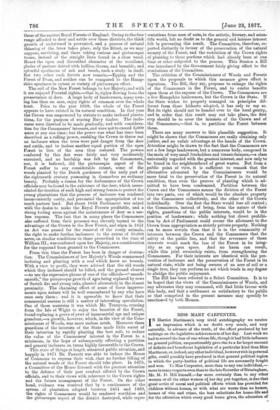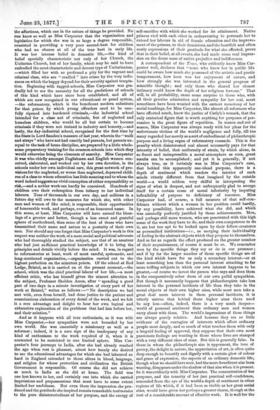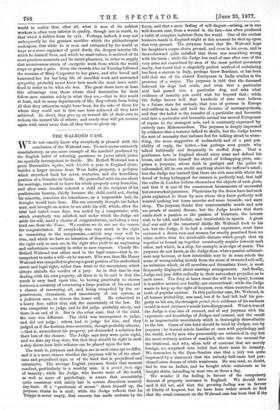MISS MARY CARPENTER,.
IHarriet Martineau's very vivid autobiography we receive 1 an impression which is no doubt very much, and very naturally, in advance of the truth, of the effect produced by her writings on the legislative achievements of her day. Last week we had to record the loss of one whose life, though it had little influence on general politics, unquestionably gave rise to a far larger amount of definite and beneficent legislation of a particular kind than Miss Martineau, or, indeed, any other individual, however rich in personal gifts, could possibly have produced in that general political region in which the party-battles of political life are necessarily fought and won. To Miss Carpenter, more than to any one individual,— more in many respects even than to the late Recorder of Birmingham, Mr. M. D. Hill himself,—fax more certainly than to any other woman or all the other women of her day put together, is due that great series of moral and political efforts which has provided for children without homes, or with what are worse than no homes, homes of vice and crime, the hest substitute. for home-life and for the education which every good home gives, the education of the affections, which can in the nature of things be provided. No one knew so well as Miss Carpenter that the organisation and legislation for which she was in so large a degree responsible, consisted in providing a very poor second-best for children who had no chance at all of the true best in early life. It was her intense belief in domestic life,—the kind of belief specially characteristic not only of her Church, the Unitarian Church, but of her family, which may be said to have embodied the most characteristic and devout type of Unitarianism, —which filled her with so profound a pity for the vagrant and criminal class, who are " cradled " into crime by the very influ- ences on which the happy depend for their security against tempta- tion. Beginning with ragged-schools, Miss Carpenter was gra- dually led to see the necessity for all the gradations of schools of this kind which have since been established, and all of which are new recognised in our educational or penal system, —the reformatory, which is the beneficent modern substitute for that prison by which young offenders used to be care- fully ripened into hardened criminals,—the industrial school intended for a class not of criminals, but of neglected and homeless children, who would be all but certain to become criminals if they were not trained to industry and honesty,—and lastly, the day-industrial school, recognised for the first time by the State in Lord Sandon's measure of last year, wherein the "waifs and strays" who have not had exactly bad parents, but parents un- equal to the task of, home discipline, are prepared by a little whole- some preparatory training for the common schools into which they would otherwise bring the elements of anarchy. Miss Carpenter it was who chiefly amongst Englishmen and English women con- ceived, elaborated, and worked out by her own devotion, in the schools under her own individual care, this great network of pro- visions for the neglected, or worse than neglected, depraved child- ren of a class to whom education has little meaning and to whom the word indeed suggests no vivid conception of either.responsibility or risk,—and a nobler work e,an hardly be conceived. Hundreds of children owe their redemption from infancy to her individual labours. Tens of thousands in our own day, and millions in a future day will owe to the measures for which she, with other men and women of like mind, is responsible, their opportunities of honourable work, and perhaps, even of an honoured name. In this sense, at least, Miss Carpenter will have earned the bless- ings of a greater and better, though a less sweet and grateful sphere of motherhood, than some of the best of those who have transmitted their name and nature to a posterity of their own race. Nor should any one forget that Miss Carpenter's work in this respect was neither the work of a mere social and political advocate who had thoroughly studied the subject, nor that of an amateur who had just sufficient practical knowledge of it to bring the principles and details vividly before the mind. It was, in regard to- reformatories at least, work of most careful, systematic, and long-continued organisation,—organisation carried out to the highest perfection on the minutest points. Of the school at Red Lodge, Bristol, as it is carried on at the present moment,—the school, which was the chief practical labour of her life,--a most efficient critic, who has himself given the utmost attention to the subject, Professor Sheldon Amos, after " spending a good part of two days in a minute investigation of every part of her work at Bristol," writes as follows :—" No description we had met with, even from herself, had done justice to the patient and conscientious elaboration of every detail of the work, and we felt it a rare advantage and delight to hear her own logical and exhaustive explanation of the problems that had lain before her, and their solution."
And as it happens with all true enthusiasts, so it was with Miss Carpenter,—her sympathies were not bounded by her own world. She was essentially a missionary as well as a reformer ; indeed, it is a sure sign of the inadequacy of any kind of enthusiasm to the work required of it, when it is contented to be restricted to one limited sphere. Miss Car- penter's four journeys to India, after she had already reached the age when rest is pleasant, attest how keenly she desired to see the educational advantages for which she had laboured so hard in England extended to those aliens in blood, language, and religion for whose protection and civilisation the British Government is responsible. Of course she did not achieve as much in India as she did at home. The field was one less known to her, and certainly one into which she carried impressions and prepossessions that must have to some extent limited her usefulness. But even there the impression she pro- duced and the gratitude she inspired remain remarkable testimonies
self-sacrifice with which she worked for its attainment. Native princes vied with each other in endeavouring to persuade her to extend her labours in aid of female education and the improve- ment of the prisons, to their dominions, and the heartfelt and often costly expressions of their gratitude for what she effected, prove that in their belief, at all events, she had made some real impres- sion on the dense mass of native prejudice and indifference.
world to realise that, after all, what it sees of its noblest workers is often very inferior in quality, though not in result, to that which is hidden from its eyes. Perhaps, indeed, it may not unfrequently be the greatest sacrifice which the philanthropist undergoes, that while he is seen and estimated by the world at large as a mere organiser of good deeds, the deepest interior life which he himself lives, and which he most values, is mulcted of its most precious momenta and its rarest pleasures, in order to supply that monotonous strain of energetic work from which the world reaps so great a gain. Even the crowds who on Tuesday followed the remains of Mary Carpenter to her grave, and who loved and honoured her for her long life of unselfish work and unwearied sympathy, probably never knew how much she must have sacri- ficed in order to be what she was. The great doers have at least this advantage over those whose chief fascination for their fellow-men consists solely in what they are,—that in this world at least, and in many departments of life, they refrain from being all that they otherwise might have been, for the sake of those for whom they could not in that case have achieved all they have achieved. In abort, they give up an inward life of their own to redeem the inward life of others ; and surely they will yet receive again with usury more than all they have so given up.




































 Previous page
Previous page